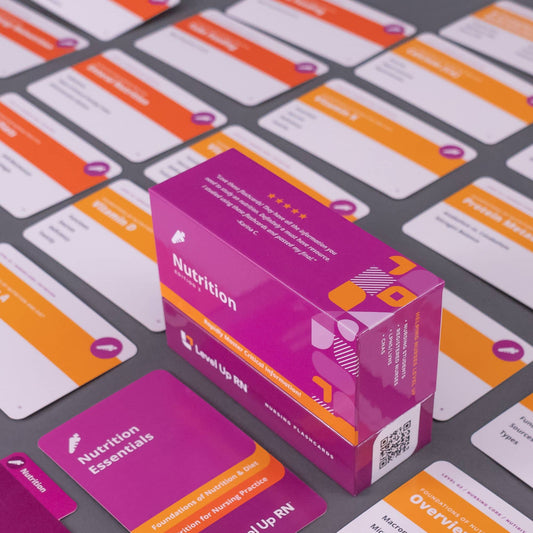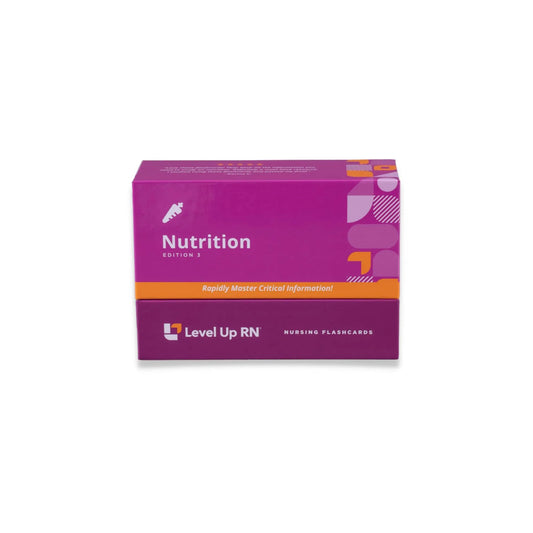Hi, I'm Cathy with Level Up RN. In this video, I am going to continue my coverage of material from our Level Up RN nutrition flashcards. Specifically, I'll be talking about key trace minerals such as iron, fluoride, iodine, and zinc. There are definitely other trace minerals, but those are the ones that are most emphasized in nursing school. At the end of this video, I'm going to give you guys a quiz to test your understanding of some of the key facts I'll be covering. So definitely stay tuned for that. And if you have our flashcards, go ahead and pull out your flashcards on trace minerals so you can follow along with me.
First up, let's talk about iron. Out of all the trace minerals, iron is the most emphasized and tested on in nursing school.
Iron is essential for hemoglobin formation and oxygen transport in the body.
Dietary sources of iron include meat, poultry, fish, fortified cereal, legumes, vegetables such as spinach, nuts, and dried fruits, such as raisins.
A deficiency in iron can result in anemia, which has signs and symptoms such as fatigue, shortness of breath, pallor, cold hands and feet, as well as tachycardia.
Treatment of iron deficiency includes increased intake of iron-rich foods as well as iron supplementation. One super important thing to remember is that vitamin C increases absorption of iron as opposed to dairy products, which decrease absorption of iron.
So you will definitely want to advise your patient to take their iron supplement with orange juice and not with milk.
For patients who will be taking an iron supplement, you need to let them know that iron supplements can cause green or tarry black stools. So this is an expected finding and not a cause for concern.
You also want to let them know that iron supplements can cause constipation. So your patient should increase their fluid and fiber intake in order to mitigate this side effect.
And then for patients who will be taking a liquid iron supplement, you should advise them to take it with a straw and to brush their teeth afterwards in order to prevent staining of the teeth.
Another key trace mineral to be familiar with is fluoride, which helps to decrease tooth decay and also supports bone growth.
Dietary sources of fluoride include treated water, coffee, tea, shrimp, and raisins.
Our silly little cool chicken hint to help you remember that fluoride helps to prevent tooth decay is your teeth will fall out and hit the floor without fluoride.
Iodine is another important trace mineral that is essential for the synthesis of thyroid hormones. You can find iodine in iodized salt, seafood, eggs, and fortified bread. And then finally, zinc is another trace mineral that I would be familiar with. Zinc is essential for wound healing, immune system function, as well as cell division and growth. Dietary sources of zinc include nuts, oysters, red meat, poultry, and beans.
All right. It's quiz time, and I've got six questions for you. Are you guys ready?
Question number one. Which trace mineral is essential for hemoglobin formation?
The answer is iron.
Question number two. A deficiency in iron can lead to blank, which can cause fatigue, pallor, and shortness of breath.
The answer is anemia.
Question number three. Which trace mineral is essential for thyroid hormone synthesis?
The answer is iodine.
Question number four, how can your patient avoid staining their teeth when taking a liquid iron supplement?
The answer is they can drink it with a straw and then rinse their mouth out afterwards.
Question number five. Which trace mineral prevents tooth decay?
The answer is fluoride.
Question number six. What change in stool is expected in a patient taking an iron supplement?
The answer is it will cause the stool to appear green or black.
All right. That's it for this video. I hope it was helpful. Take care, and thank you so much for watching.


